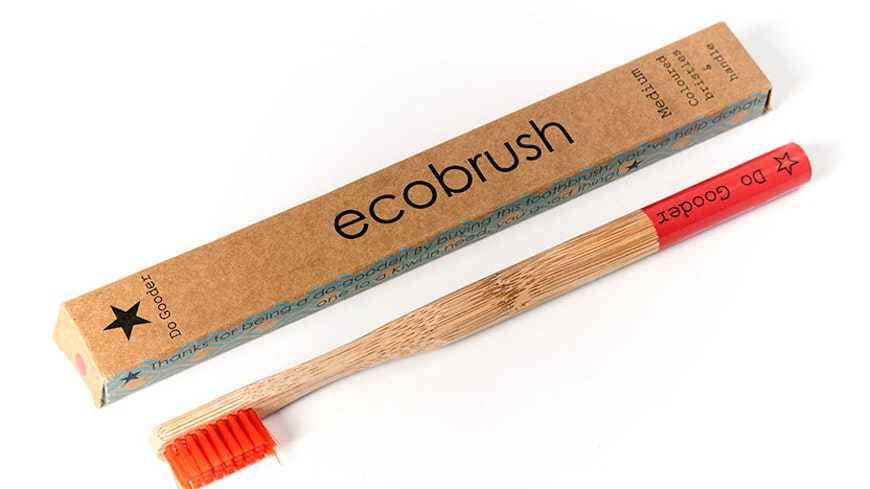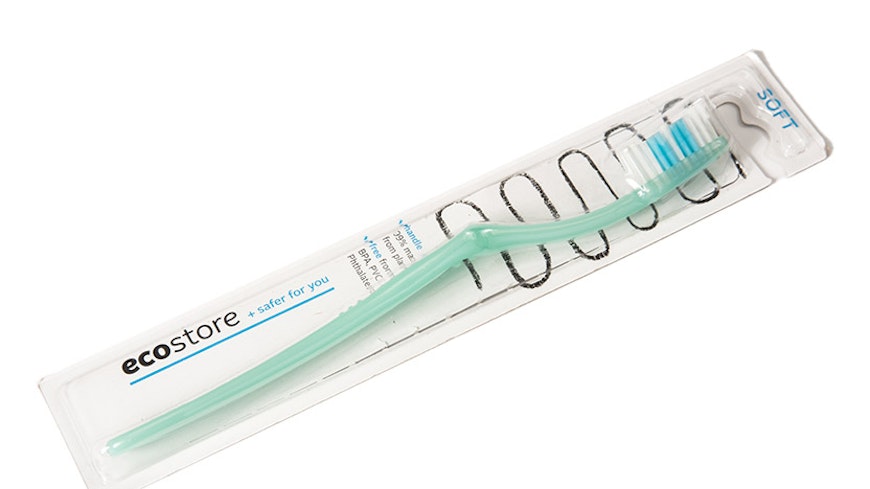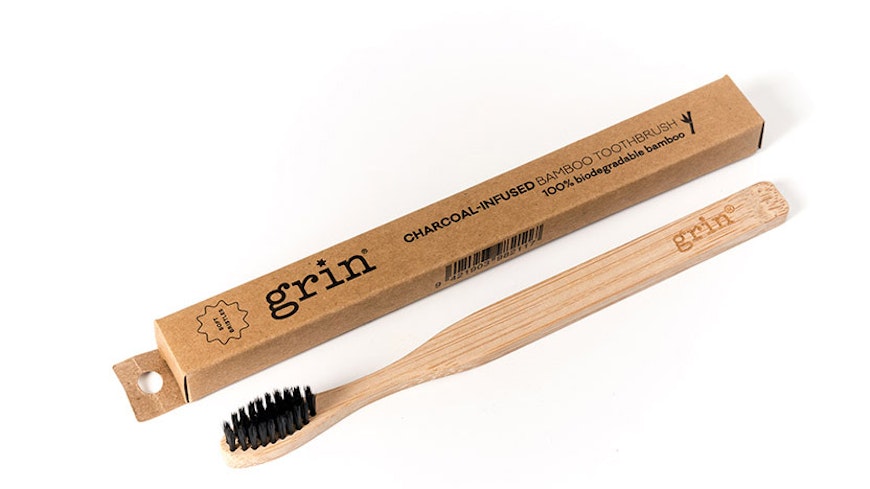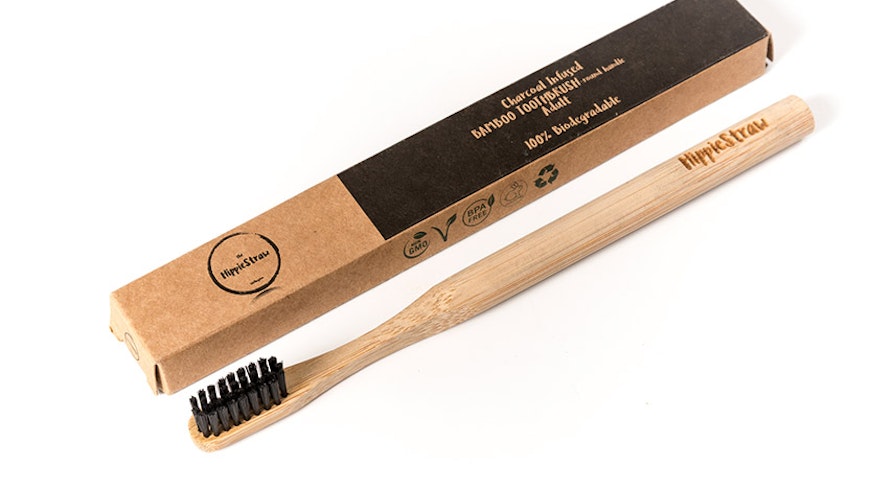If you’re keen on reducing the plastic in your home, bamboo toothbrushes promise to help you do just that. Some even come with charcoal-infused bristles that claim antibacterial and teeth-whitening properties. However, some of these products overstate their eco-credentials and health benefits.
We checked out the claims of five toothbrushes marketed as better environmental choices. Their main selling point is that the handles are made from renewable or sustainable materials that are biodegradable or can be recycled.
Three of the brushes we looked at had handles made from bamboo and two were from plant-based materials. But, like standard brushes, the bristles were made of nylon, polyester, or a mix of plant material and nylon, which isn’t easily recycled.
Buying toothbrushes with handles made from plants reduces plastic waste. But whether the plant materials used come from a sustainably managed source is another question.
Only one of the companies we contacted, Grin Natural, said it had independent certification to support its sustainability claims.
Hippie Straw didn’t make sustainability claims but said its brush was made from a renewable source and “100% biodegradable”. We questioned its biodegradability claim because the product’s bristles are made of nylon, which isn’t going to decompose anytime soon. The company said it was rolling out a new product and packaging would make clear the claim only referred to the bamboo handle, rather than the whole brush.
Are they really recycled?
Ecostore and Grin Natural both advertise recycling programmes for their brushes.
Ecostore said its scheme lets customers return brushes, so the plant-based plastic in the handles can be recycled. However, it doesn’t recycle the bristles. The company said it hasn’t received many brushes.
Grin Natural said it’s teamed up with TerraCycle so it can recycle toothbrush bristles (and toothpaste tubes) into bench seats and watering cans. However, it's yet to receive enough products back to begin recycling.
Other companies selling bamboo brushes suggest you break off the head, or use pliers to tweeze out the nylon bristles before you throw the handle in the compost or garden. If you haven’t got the patience, we found it easy enough to snap off the head of bamboo brushes. As for your busted bristles, with limited recycling options they’re likely to end up in the landfill.
Charcoal confusion
Charcoal is making its way into everything from deodorants to smoothies. Three of the toothbrushes we bought boasted “charcoal-infused” bristles.
Grin Natural claims charcoal “naturally whitens teeth” and has antiseptic properties to help “keep bacteria at bay”. It also says charcoal bristles “help to prevent plaque build-up”. In a similar vein, The Hippie Straw brush claims the charcoal in its bristles has “natural whitening” and “antibacterial” properties.
However, these claims aren’t backed by good evidence and we think they’re misleading.
A 2017 review of charcoal in dentistry products, published in the Journal of the American Dental Association, found there wasn’t good evidence to support the safety and efficacy claims made for charcoal.
Jonathan Broadbent, University of Otago associate professor in dental public health, said “charcoal bristles won’t help reduce plaque build-up any more than regular toothbrush bristles, claiming otherwise is false advertising”.
He said brushing your teeth protects them from decay because it physically disturbs the plaque biofilm. Your brushing technique and the toothpaste used are more important than what makes up the bristles.
“When we brush our teeth, we aren’t after an ‘antiseptic’ effect. The main thing we want is to physically knock the bacteria off our teeth. We don’t need to kill them to do that.”
Dr Broadbent said the benefits of using a charcoal-bristled toothbrush are unproven. You could also put yourself at risk of dental abrasion.
He also cautioned against long-term use of charcoal-based toothpastes because of the risk of abrasion. While charcoal toothpaste might help remove stains on the surface of teeth, it won’t make the teeth themselves whiter. These products aren’t solving your problem – you’re better to see a dentist to find out why your teeth are getting stained, Dr Broadbent said.
Toothbrushes

Do Gooder Ecobrush
Price: $5.00
Made from: Bamboo handle, nylon bristles, packed in a cardboard box.
Claims: Biodegradable bamboo handle, made from organic, sustainable bamboo.
We found: Do Gooder markets this toothbrush as an “ecobrush” made from organic, sustainable bamboo, but doesn’t have independent certification to back up these claims. The company cited the cost of getting certified as the reason it hadn’t gone down this track, but said it's now going to do so.
Ecostore Soft Toothbrush

Price: $4.50
Made from: Handles are 99% castor plant-based plastic and 1% mineral-based colour pigment, bristles are 60% castor plants and 40% regular nylon, cardboard and clear plastic packaging.
Claims: Sustainably produced, 99% made from renewable Carbon Capture plant-based materials, free from BPA, PVC, and phthalates, cruelty free, fully recyclable packaging.
We found: Ecostore’s toothbrush is made in Switzerland, although the company wouldn’t tell us its supplier so we couldn’t check its sustainability claim. Don’t mistake the “Carbon Capture” logo on the packaging for independent certification: the trademark is Ecostore’s own design.
Grin Charcoal-Infused Bamboo Toothbrush

Price: $3.99
Made from: Bamboo handle, polyester (PBT) bristles, packed in a cardboard box.
Claims: 100% biodegradable bamboo, made from sustainable bamboo, infused with a premium activated charcoal, which has been recognised for its antibacterial and detoxifying properties.
We found: Grin Natural said the bamboo it uses is certified as sustainably managed by the Forest Stewardship Council. But we don’t think there’s good evidence to back up the company’s claims that charcoal-infused bristles reduce plaque and destroy bacteria.
Grin Natural Eco Friendly Toothbrush

Price: $4.99
Made from: Corn starch handle, polyester (PBT) bristles, cardboard and clear blister packaging from plant-based plastic.
Claims: Made from sustainable non-GMO corn starch, which means the toothbrush handle is 100% biodegradable, premium charcoal-infused bristles, antiseptic properties of charcoal help to keep bacteria at bay, BPA and PVC free, biodegradable packaging.
We found: Grin Natural’s corn starch-handled brush makes the same claims about the antiseptic properties of charcoal. As for the “100% biodegradable” claim, the company said the raw materials are certified as compostable. It's now investigating independent certification for the finished product.
The Hippie Straw Charcoal Infused Bamboo Toothbrush

Price: $4.50
Made from: Bamboo handle, nylon bristles, packed in a cardboard box.
Claims: 100% biodegradable, vegan friendly, 100% BPA free, cruelty free, GMO free, and from a renewable source. The bristles are infused in charcoal for its natural whitening and antibacterial qualities.
We found: The brush claims to be “100% biodegradable” but its nylon bristles aren’t going to decompose anytime soon. When we questioned the company, it said it was rolling out a new product and would change the wording so the claim only referred to the bamboo handle. We think it should also ditch the charcoal claims.
GUIDECLAIMS are from product packing and company websites.
Environmental impact
Your old toothbrush may seem like a small contribution to our landfills but the environmental cost of scrubbing our pearly whites adds up.
If we follow dentists’ advice and replace our toothbrushes every three months, we send about 287,640kg of plastic toothbrushes to the tip every year. And that doesn’t include the packaging.
One toothbrush = 15g
Four toothbrushes a year per person = 60g
Four toothbrushes x population of NZ (4.794m) = 287,640kg of plastic to landfill.